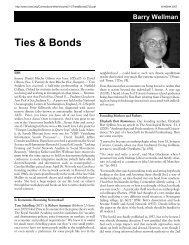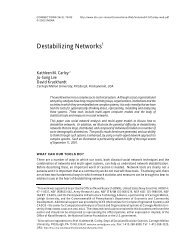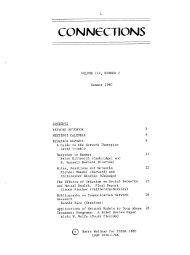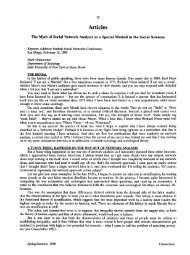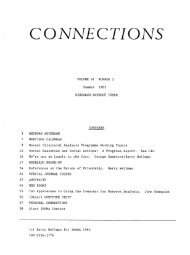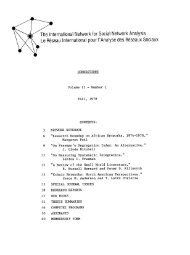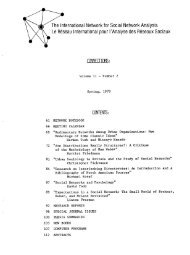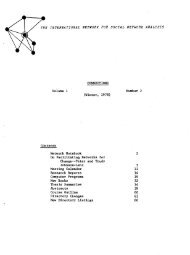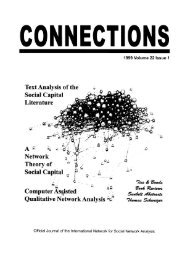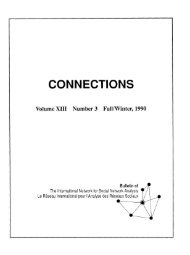Sunbelt XXXI International Network for Social Network ... - INSNA
Sunbelt XXXI International Network for Social Network ... - INSNA
Sunbelt XXXI International Network for Social Network ... - INSNA
You also want an ePaper? Increase the reach of your titles
YUMPU automatically turns print PDFs into web optimized ePapers that Google loves.
Lotico The Semantic <strong>Social</strong> <strong>Network</strong>Neumann, MarcoOrganizational <strong>Network</strong>sScientific <strong>Network</strong>s, Semantic <strong>Network</strong>s, <strong>Social</strong> <strong>Network</strong>s, Online <strong>Network</strong>sSUN.AM1A Semantic <strong>Social</strong> <strong>Network</strong> (SSN) is a new product category that combines features of online social networking sites with Semantic Web technologies tomaximize data fidelity and data reusability across heterogeneous social networking products. With the increasing number of online networking sites and socialmedia content offerings propriety data <strong>for</strong>mats become a road block <strong>for</strong> efficient data management and transfer across community boundaries. Centralizedservices and API based data exchange are a temporary fix to tackle this issue but do not address the challenge of data mobility that we already face with thegrowing data deluge on the world wide web. In a Semantic <strong>Social</strong> <strong>Network</strong> the business logic of social practice become first class objects, uniquely identifiableon the web and maybe most importantly relationships between objects become first class objects as well, and thereby are now negotiable amongst users andwill allow <strong>for</strong> entirely new services on the web. In this presentation we will take a look at Lotico a Semantic <strong>Social</strong> <strong>Network</strong> with more than 15000 membersworldwide that share a common interest in the Semantic Web. Lotico’s core plat<strong>for</strong>m is powered with semantic technologies, that now enable Lotico topublish its content in <strong>for</strong>m of Linked Open Data to the public web. In addition to the core plat<strong>for</strong>m Lotico augments existing social networking and communitysites such as meetup.com, mediawiki and facebook to allow members to utilize Lotico resources across heterogeneous community plat<strong>for</strong>ms, to find contentand to connect people across sites.(Love)birds Of A Feather: Online Dating And Homophily Preference In Romantic RelationshipsBlackwell, Derek R.Qualitative and Mixed Method <strong>Network</strong> studiesQualitative Approaches, Homophily, Online DatingFRI.AM1As a growing number of singles are taking their search <strong>for</strong> partners to the Web, the question arises of how this new dating <strong>for</strong>um could potentially influencethe mate‐selection process. This study explores how online dating as a method of relationship‐initiation might affect tendencies <strong>for</strong> homophily within romanticrelationships. Through in‐depth interviews with adult Internet users who have experience in both online and offline dating methods (N = 28) , this researchattempts to: (1) identify patterns of homophily within online‐initiated and offline‐initiated romantic relationships, (2) describe the social processes drivinghomophily in romantic relationships, and (3) determine whether or not the online medium influences an individual’s cognitive approach to choosing a romanticpartner (i.e. which characteristics are viewed as most important in a potential partner). As respondents described their experiences, common themes included(1) a more rational and strategic approach when seeking partners online, which often included increased selectivity; (2) a heightened awareness ofcommonalities in the online dating realm, which shaped likelihood of initial interaction; and (3) an excessive number of partner choices on most dating sitesthat prompted users to seek ways of narrowing the dating pool. These findings coupled with previous research on homophily preference suggest the possibilitythat, over time, online dating may lead to increased homophily in romantic relationships.



